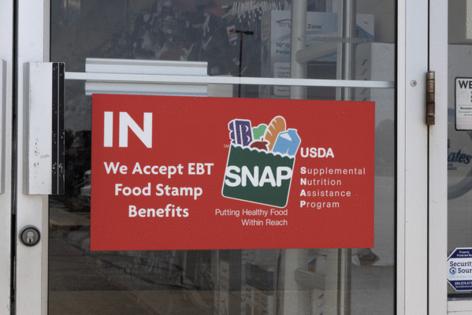Courts order Trump to keep paying food stamps amid shutdown
Published in News & Features
WASHINGTON — Two federal judges ruled the Trump administration’s decision to suspend food-aid benefits for tens of millions of Americans during the government shutdown is likely unlawful and that U.S. officials must use contingency funding to at least partially keep the program operational.
U.S. District Judge John McConnell in Rhode Island on Friday announced in court that he would order the U.S. Department of Agriculture to distribute a pool of contingency money “as soon as possible” for November benefits. He also urged the administration to explore tapping other sources of federal dollars to ensure the program is fully funded.
Minutes earlier in Boston, U.S. District Judge Indira Talwani issued a written ruling that rejected the administration’s stance that it is legally barred from tapping into billions of dollars in alternative funding sources to keep the program running during the budget impasse in Congress.
Both cases involve lawsuits seeking to keep federal dollars flowing to the Supplemental Nutrition Assistance Program, or SNAP. The Agriculture Department, which administers the program, had said it would halt benefits starting in November until Congress approves a new spending deal.
More than 42 million people in 22 million households nationwide receive SNAP benefits, according to government data. Advocates argued in court that a suspension of benefits would exacerbate food insecurity across the country, on top of the strain already facing the millions of federal workers who haven’t received paychecks since the shutdown began on Oct. 1.
Talwani stopped short of formally ordering the department to fully fund program benefits for November. Instead, she gave U.S. officials until Nov. 3 to file a report on whether they would authorize at least partially funding the program using a contingency fund now that they had her legal conclusions.
The contingency fund has $5.25 billion, according to the Justice Department. The program costs about $8.2 billion a month. States fund additional administrative costs.
Talwani also ordered a timeline for delivering the benefits and asked whether the government would use other sources to complete payouts.
McConnell’s order came in a case brought by nonprofits and Democratic-led cities, while Talwani’s came in a lawsuit brought by more than two dozen Democratic-led states and the District of Columbia.
Skeptical Judge
During arguments Thursday, Talwani was skeptical of the government’s stance that officials are legally barred from using billions of dollars in available contingency funds.
Congress was trying “to protect the American people,” Talwani said of the additional dollars that lawmakers previously approved to sit in reserve. “What Congress was trying to do is, if you don’t have enough money, we’ll tighten our belt,” she said, not jeopardize people’s wellbeing because of a “political game.”
The federal government sends SNAP funds to states to administer to eligible residents, who receive the money each month via a benefits card they can use to pay for groceries, similar to a bank debit card.
The Agriculture Department spends roughly $8 billion each month to fund SNAP benefits, according to court filings. The administration was able to fully provide October benefits before the shutdown began at the start of the new fiscal year on Oct. 1. As the budget impasse dragged on, however, the department told states to stop taking steps to make the benefits available for November.
The lawsuits center on SNAP contingency money that Congress approved long before the shutdown started. The Justice Department told Talwani there is $5.25 billion in that reserve fund. Congress also designated money for child nutrition programs from the proceeds of import tariffs that the states say also could be used. The administration recently transferred $300 million from that fund to keep the Women, Infants, and Children program running during the shutdown.
Not Available
The Agriculture Department has maintained that it can only use the contingency money to “supplement” existing funds that Congress approved to pay for SNAP benefits in a specific fiscal year. The reserve money isn’t available now that there’s no longer funds left from the previous fiscal year, the government argues.
The Democratic officials contend the government must exhaust available funding sources before halting payments for a program that Congress deemed mandatory. They said the government’s stance conflicted with guidance that the department published before the shutdown stating that the reserve funds would be available to keep the program running.
Although Republicans control both chambers of Congress, they need support from several Democrats to clear procedural hurdles in the Senate and pass a new spending bill. Most Senate Democrats have been united in pressing for a budget deal to include a renewal of expiring health insurance subsidies.
The cases are Massachusetts v. Department of Agriculture, 25-cv-13165, U.S. District Court, District of Massachusetts (Boston) and Rhode Island State Council of Churches v. Rollins, 25-cv-569, U.S. District Court, District of Rhode Island (Providence).
©2025 Bloomberg L.P. Visit bloomberg.com. Distributed by Tribune Content Agency, LLC.







Comments